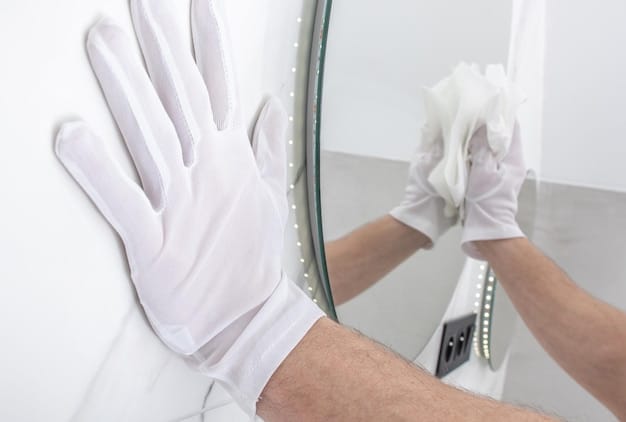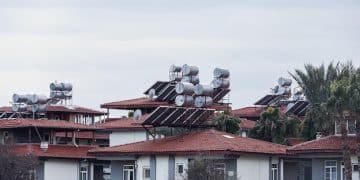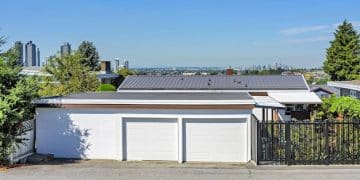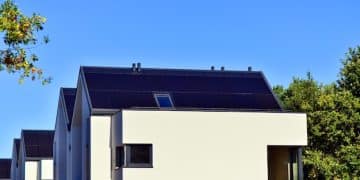Solar Panel Maintenance: Extend Life & Save Money in the US

Solar panel maintenance is crucial for extending the life of your system and maximizing your investment; regular cleaning, inspections, and timely repairs can significantly improve efficiency and prevent costly long-term issues, ensuring optimal performance and savings.
Investing in solar panels is a smart move towards energy independence and sustainability. However, like any significant investment, your solar panel system requires regular solar panel maintenance: how to extend the life of your system and save money. Neglecting maintenance can lead to decreased efficiency and costly repairs down the road. Let’s explore how proper care can maximize your system’s lifespan and help you save money.
Understanding the Importance of Solar Panel Maintenance
Solar panels are designed to withstand harsh weather conditions, but they are not invincible. Over time, dirt, debris, and environmental factors can accumulate on the surface, reducing their ability to absorb sunlight efficiently. Neglecting solar panel maintenance can lead to a gradual decline in performance, lower energy production, and ultimately, a shorter lifespan for your system.
Think of your solar panels like a car. Routine maintenance optimizes performance and prevents small issues from escalating into larger, and more expensive, problems. By understanding the importance of regular care, you can ensure your solar panels operate at peak efficiency, maximizing your return on investment and contributing to a more sustainable future.

Essential Solar Panel Cleaning Techniques
Cleaning your solar panels is a relatively simple task that can significantly impact their performance. Depending on location and environmental conditions, panels should be cleaned one to four times a year. When cleaning panels, use the right kind of cleaners and tools!
The goal is to remove dust, dirt, leaves, and other debris that can block sunlight and reduce energy production. Here’s how to do it effectively:
Gathering the Right Supplies
Before you start the cleaning process, make sure you have the necessary supplies. This includes a soft brush, a hose with a spray nozzle, and a mild soap specifically designed for solar panels. Regular dish soap is okay in a pinch, but be sure to use a small amount and mix it with plenty of water. Avoid using harsh chemicals or abrasive cleaners.
- Soft Brush: A soft-bristled brush is ideal for removing loose dirt and debris without scratching the surface of the panels.
- Hose and Spray Nozzle: A hose with an adjustable spray nozzle will allow you to rinse the panels thoroughly and remove any remaining soap residue. Set yours for a gentle wide fan spray.
- Mild Soap: Use a soap specifically designed for solar panels or a mild dish soap to gently clean the panels without causing damage.
The Cleaning Process
Start by rinsing the panels with water to remove any loose dirt and debris. Then, mix a small amount of soap with water and apply it to the panels using the soft brush. Gently scrub the surface to remove any stubborn dirt or grime. Finally, rinse the panels thoroughly with water to remove any soap residue.
Be careful in your cleaning process! Remember, safety is paramount. Never climb onto the roof without proper safety equipment, and always follow the manufacturer’s instructions for cleaning your specific type of solar panels.
Regular cleaning helps solar panel maintenance, ensuring your panels operate efficiently and generate the maximum amount of energy. This simple task can significantly extend the lifespan of your system and save you money in the long run.
Inspecting Your Solar Panels for Damage
Beyond regular cleaning, routine inspections are crucial for identifying potential issues early on. Regular inspections can help identify and address problems before they escalate, saving you time and money in the long run.
Look for signs of physical damage, such as cracks, chips, or discoloration, all of which can affect performance. Here’s what to look for:

Common Signs of Damage
Cracks, chips, or other physical damage to the surface of the panels can compromise their ability to generate electricity. Discoloration or yellowing can indicate overheating or other issues that need to be addressed. Be aware that these can be subtle signs.
Checking Wiring and Connections
Loose or corroded wiring and connections can also impact the performance of your solar panels. Inspect all wiring and connections for signs of damage or corrosion. Ensure that all connections are tight and secure.
Professional Inspections
Consider scheduling regular professional inspections to ensure your solar panels are functioning properly. A qualified technician can identify potential issues that may not be visible to the untrained eye. Look for an inspector specializing in solar panel maintenance.
Identifying and addressing damage early on is essential for maintaining the efficiency and longevity of your solar panel system. Regular inspections allow you to catch potential problems before they escalate, saving you money and ensuring your system operates at peak performance.
The Impact of Environmental Factors on Solar Panels
Environmental factors play a significant role in the performance and lifespan of solar panels. Understanding how these factors affect your system can help you take proactive measures to mitigate their impact. Different weather conditions affect how your panels function and what the best maintenance strategy is.
From extreme temperatures to heavy snow, various environmental elements can impact the efficiency and longevity of your system. Here’s how some common environmental factors can affect your solar panels:
- Extreme Temperatures: High temperatures can cause solar panels to overheat, reducing their efficiency. Cold temperatures can also impact performance, but generally to a lesser extent.
- Snow and Ice: Heavy snow accumulation can block sunlight and reduce energy production. Ice can also cause damage to the panels if it forms and thaws repeatedly.
- Dust and Debris: Dust, dirt, leaves, and other debris can accumulate on the surface of the panels, blocking sunlight and reducing efficiency.
Mitigating Environmental Impact
To mitigate the impact of environmental factors on your solar panels, consider the following strategies. Regular cleaning helps remove dust and debris, ensuring optimal sunlight absorption. Snow removal may be necessary in regions with heavy snowfall. Monitor panel performance closely and address any sudden drops in energy production.
By understanding the impact of environmental factors and taking proactive measures to mitigate their effects, you can help prolong the lifespan of your solar panel system and ensure optimal performance.
Being aware of environmental impacts on solar panel maintenance will help you be proactive about fixing or managing the issues. This extends your lifespan, and maximizes your investment.
DIY vs. Professional Solar Panel Maintenance
When it comes to solar panel maintenance, you have two options: do it yourself or hire a professional. Both approaches have their pros and cons, and the best choice will depend on your skills, comfort level, and budget.
Simple tasks like cleaning can often be handled by homeowners, while more complex issues may require the expertise of a professional. However, be sure to weigh the pros and cons. Here’s a breakdown to help you decide:
DIY Maintenance
DIY maintenance typically involves basic tasks such as cleaning and visual inspections. The advantages of DIY maintenance include lower costs and greater control over the process. You can save money on professional service fees and perform maintenance tasks on your own schedule.
Professional Maintenance
Professional maintenance involves more in-depth inspections, repairs, and servicing. The advantages of professional maintenance include expertise, specialized tools, and a comprehensive assessment of your system’s performance. Professionals can identify and address issues that may not be visible to the untrained eye.
For issues beyond your skill level or comfort zone, it’s best to hire a qualified professional. Professional maintenance can ensure that your system is operating at peak efficiency and prevent costly repairs in the future. It is important to factor the cost of professional services from your financial planning regarding your solar system.
Consider your skills, comfort level, and budget when deciding between DIY and professional solar panel maintenance. Both approaches can help extend the life of your system and maximize your return on investment.
Investing in Solar Panel Maintenance: Cost vs. Benefits
Investing in solar panel maintenance requires careful consideration of the costs and benefits involved. While maintenance does incur expenses, the long-term benefits far outweigh the initial investment.
Regular maintenance can help you avoid costly repairs, maximize energy production, and extend the lifespan of your system. Consider the true value of investing in maintenance for your solar system. Here’s a look at the cost vs. benefits:
- Cost Savings: Regular maintenance can help you avoid costly repairs by identifying and addressing issues early on.
- Increased Efficiency: Clean solar panels produce more energy, maximizing your return on investment.
- Extended Lifespan: Proper maintenance can extend the lifespan of your system, ensuring it operates efficiently for years to come.
The costs associated with maintenance include the cost of cleaning supplies, professional service fees, and any necessary repairs. These costs are relatively minor compared to the potential savings and benefits that result from regular care. Proper solar panel maintenance can significantly increase their long-term value.
Investing in solar panel maintenance is a smart financial decision that can help you save money, maximize energy production, and extend the lifespan of your system. Evaluate the costs and benefits to determine the best approach for your specific needs.
Troubleshooting Common Solar Panel Issues & Maintenance
Even with regular maintenance, you may encounter common issues with your solar panels. Knowing how to troubleshoot these issues can save you time and money. Sometimes these issues affect specific panels, and sometimes they affect the whole system.
From decreased energy production to system malfunctions, various problems can arise. Troubleshooting includes how to identify and address them. Here’s a guide to some common problems and solutions:
Decreased Energy Production
If you notice a sudden drop in energy production, check for signs of dirt, debris, or physical damage. Clean the panels if necessary and inspect wiring and connections for any issues.
System Malfunctions
If your system is not functioning correctly, consult the manufacturer’s instructions or contact a qualified technician for assistance. Do not attempt to repair complex issues on your own.
Inverter Problems
Inverter problems can impact the performance of your solar panel system. Check the inverter for error messages or unusual behavior. Restart the inverter and monitor its performance. If the problem persists, contact a qualified technician.
Knowing how to troubleshoot common issues can help you maintain your solar panel system and address problems effectively. If you’re unsure about any troubleshooting steps, seek professional advice for assistance in evaluating your solar panel maintenance.
| Key Point | Brief Description |
|---|---|
| ☀️ Regular Cleaning | Remove dust and debris to maintain optimal sunlight absorption and panel efficiency. |
| 🔎 Routine Inspections | Check for cracks, discoloration, and wiring issues to address problems early. |
| 💰 Cost Savings | Maintenance helps avoid costly repairs, maximizes energy production, and extends the system’s life. |
| 🛡️ Environmental Impact | Mitigate temperature, snow, and debris effects with proactive measures. |
Frequently Asked Questions about Solar Panel Maintenance
▼
The frequency of cleaning depends on your location and environmental conditions. In general, cleaning your panels one to four times per year is recommended. Areas with high dust or pollution may require more frequent cleaning.
▼
It is best to use a mild soap specifically designed for solar panels. Regular dish soap can be used in a pinch, but use only a small amount and mix it with plenty of water. Avoid harsh chemicals or abrasive cleaners.
▼
Inspect your panels for cracks, chips, or discoloration. Check wiring and connections for signs of damage or corrosion. Ensure all connections are tight and secure. Consider scheduling professional inspections for a comprehensive assessment.
▼
Professional maintenance offers expertise, specialized tools, and a comprehensive system assessment. Professionals can identify and address issues that may not be visible to the untrained eye, ensuring optimal performance and longevity.
▼
In regions with heavy snowfall, consider removing snow from your solar panels to ensure optimal sunlight absorption. Use a soft brush or broom to gently remove the snow without scratching the surface of the panels.
Conclusion
Proper solar panel maintenance is essential for extending the life of your system and maximizing your investment. By following the tips and guidelines outlined in this guide, you can ensure your solar panels operate at peak efficiency for years to come, saving you money and contributing to a more sustainable future.





